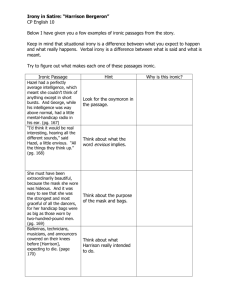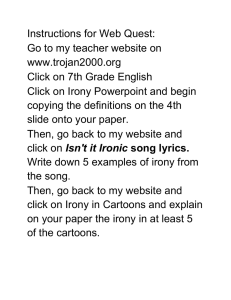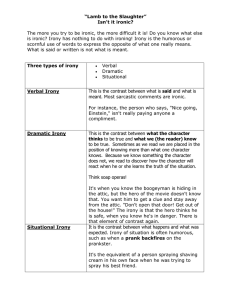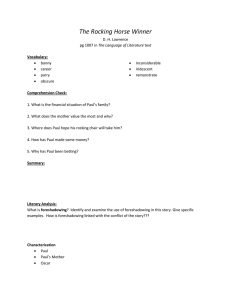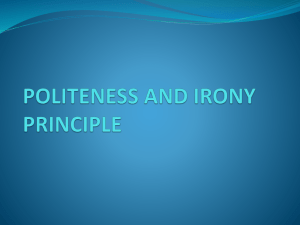Aim of the research What is irony? The experiment Conclusion
advertisement
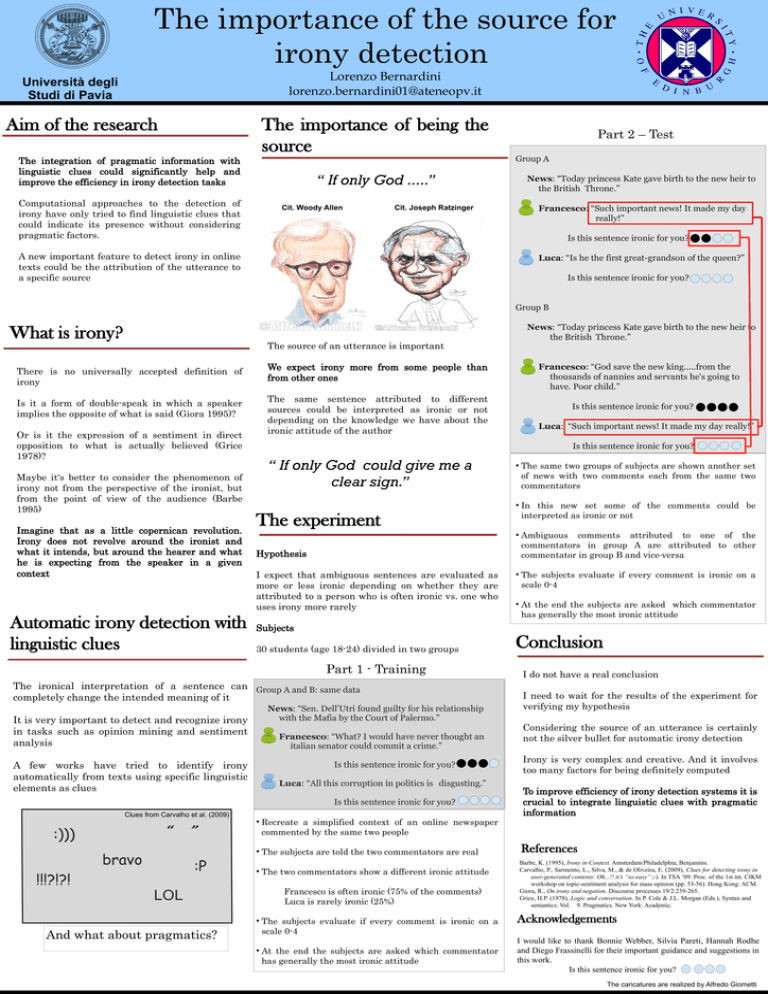
The importance of the source for irony detection Lorenzo Bernardini lorenzo.bernardini01@ateneopv.it Università degli Studi di Pavia Aim of the research The importance of being the source The integration of pragmatic information with linguistic clues could significantly help and improve the efficiency in irony detection tasks Part 2 – Test Group A “ If only God .....” Computational approaches to the detection of irony have only tried to find linguistic clues that could indicate its presence without considering pragmatic factors. Cit. Woody Allen News: “Today princess Kate gave birth to the new heir to the British Throne.” Francesco: “Such important news! It made my day really!” Cit. Joseph Ratzinger Is this sentence ironic for you? A new important feature to detect irony in online texts could be the attribution of the utterance to a specific source Luca: “Is he the first great-grandson of the queen?” Is this sentence ironic for you? Group B What is irony? The source of an utterance is important There is no universally accepted definition of irony We expect irony more from some people than from other ones Is it a form of double-speak in which a speaker implies the opposite of what is said (Giora 1995)? The same sentence attributed to different sources could be interpreted as ironic or not depending on the knowledge we have about the ironic attitude of the author Or is it the expression of a sentiment in direct opposition to what is actually believed (Grice 1978)? Maybe it's better to consider the phenomenon of irony not from the perspective of the ironist, but from the point of view of the audience (Barbe 1995) Imagine that as a little copernican revolution. Irony does not revolve around the ironist and what it intends, but around the hearer and what he is expecting from the speaker in a given context Automatic irony detection with linguistic clues “ If only God could give me a clear sign.” Hypothesis I expect that ambiguous sentences are evaluated as more or less ironic depending on whether they are attributed to a person who is often ironic vs. one who uses irony more rarely Subjects 30 students (age 18-24) divided in two groups News: “Sen. Dell'Utri found guilty for his relationship with the Mafia by the Court of Palermo.” Francesco: “What? I would have never thought an italian senator could commit a crime.” Is this sentence ironic for you? Luca: “All this corruption in politics is disgusting.” Is this sentence ironic for you? Clues from Carvalho et al. (2009) ● ● :P ● ● A few works have tried to identify irony automatically from texts using specific linguistic elements as clues bravo Luca: “Such important news! It made my day really!” The experiment It is very important to detect and recognize irony in tasks such as opinion mining and sentiment analysis “ ” Is this sentence ironic for you? ● The ironical interpretation of a sentence can Group A and B: same data completely change the intended meaning of it :))) Francesco: “God save the new king.....from the thousands of nannies and servants he's going to have. Poor child.” Is this sentence ironic for you? Part 1 - Training !!!?!?! News: “Today princess Kate gave birth to the new heir to the British Throne.” ● Recreate a simplified context of an online newspaper commented by the same two people The subjects are told the two commentators are real The two commentators show a different ironic attitude Francesco is often ironic (75% of the comments) Luca is rarely ironic (25%) LOL ● And what about pragmatics? ● The subjects evaluate if every comment is ironic on a scale 0-4 At the end the subjects are asked which commentator has generally the most ironic attitude ● ● The same two groups of subjects are shown another set of news with two comments each from the same two commentators In this new set some of the comments could be interpreted as ironic or not Ambiguous comments attributed to one of the commentators in group A are attributed to other commentator in group B and vice-versa The subjects evaluate if every comment is ironic on a scale 0-4 At the end the subjects are asked which commentator has generally the most ironic attitude Conclusion I do not have a real conclusion I need to wait for the results of the experiment for verifying my hypothesis Considering the source of an utterance is certainly not the silver bullet for automatic irony detection Irony is very complex and creative. And it involves too many factors for being definitely computed To improve efficiency of irony detection systems it is crucial to integrate linguistic clues with pragmatic information References Barbe, K. (1995), Irony in Context. Amsterdam/Philadelphia, Benjamins. Carvalho, P., Sarmento, L., Silva, M., & de Oliveira, E. (2009), Clues for detecting irony in user-generated contents: Oh...!! it’s ‘‘so easy’’ ;-). In TSA ’09: Proc. of the 1st int. CIKM workshop on topic-sentiment analysis for mass opinion (pp. 53-56). Hong Kong: ACM. Giora, R., On irony and negation. Discourse processes 19/2:239-265. Grice, H.P. (1978), Logic and conversation. In P. Cole & J.L. Morgan (Eds.), Syntax and semantics: Vol. 9. Pragmatics. New York: Academic. Acknowledgements I would like to thank Bonnie Webber, Silvia Pareti, Hannah Rodhe and Diego Frassinelli for their important guidance and suggestions in this work. Is this sentence ironic for you? The caricatures are realized by Alfredo Giometti
